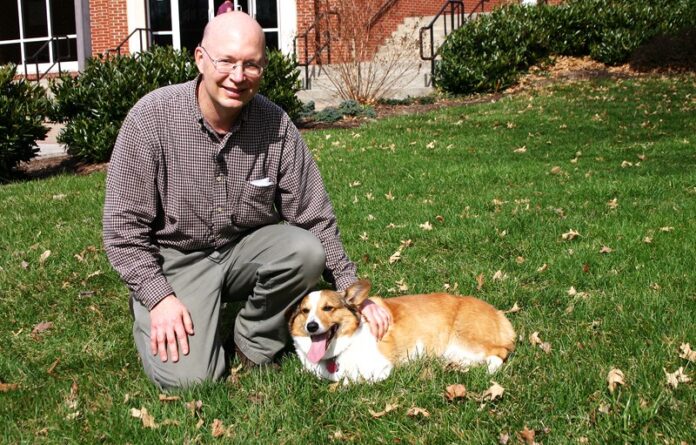
Many dogs love to run after a ball when someone throws it. But how many pet owners realize their dogs are actually solving a mathematical equation on the fly?
Elvis the Calculus dog and his owner, Hope College professor Dr. Tim Pennings, travel the country demonstrating this principle — and this week they stopped at Roanoke College and the University of Virginia.
Pennings adopted Elvis when the Welch Corgi was just a year old. Pennings says the “eureka” moment happened early on in their relationship. “He had been chasing balls since he was a pup. But when I first got him, I took him to my favorite beach and I threw it in the water (Lake Michigan) and I think probably within the first couple throws I noticed that he was doing the same pattern that I show on the board every time I teach calculus. I call it a Tarzan-Jane problem where one of them is in the quicksand and the other one’s got to run down the bank and across the river to get to their partner before they sink. And Elvis was doing exactly the same pattern.”
He says getting to the ball in a hurry is intuitive to dogs. “[Beginning with] his great ancestors…the one that was best at getting to the carcass first, was the one that was most likely to eat and survive, and pass on their genes to surviving generations and it goes all the way down to Elvis.”
He says the main point in his talk is that finding the optimal solution to a problem is frequently seen in nature, “whether it be bees with a beehive, or spiders making a web, or the leaves of a tree, or light going through a prism, or all sorts of different situations.”
“For people who teach calculus and are always trying to find a nice example to kind of show their students, this is where you see calculus in real life; this would be a great example of it.”
His students see Elvis’ natural ability to do calculus when he chases the ball. “And when I walk around campus, some of them will sometimes say, ‘Oh, that dog knows calculus better than I do’ or ‘He’s smarter than I am.’”
Pennings says they start their talk by confirming Elvis wants to get to the ball as quickly as possible. “And so I throw the ball down the hallway, then he runs after it and he shows how eager he is to get the ball.” With his part of the presentation done, the 10-year-old Elvis sits in the corner and waits for his owner to finish.
A couple of French mathematicians performed the same experiment with their black Lab and got the same result. They wrote a paper which Pennings and Roanoke College mathematics professor Dr. Roland Minton followed up on with their joint paper, “Do Dogs Know Bifurcations?” The Pennings/Minton paper won the 2008 George Polya Award for mathematical exposition.
Elvis and Pennings have been traveling together talking to campuses for about eight years. He says kids love to pet Elvis during their stops and people of all ages come to hear their talk.
By Beverly Amsler [email protected]

